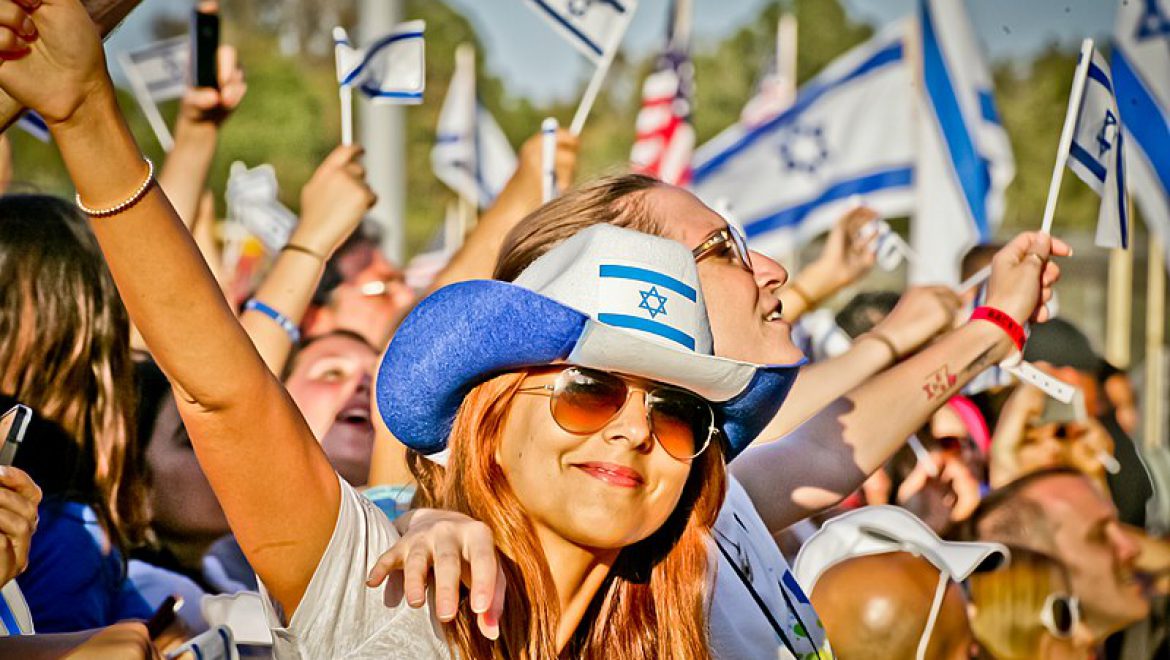
In this bold article, Rabbi Vernon Kurtz suggests a number of mitzvot – religious commandments – which he claims should be observed by Diaspora Jewry, including moving to Israel, supporting Israel financially, politically and spiritually, creating special prayers and ceremonies, and committing to work toward turning Israel into the model society it is meant to be. Rabbi Vernon Kurtz is President of Mercaz Olami, the World Organization of the Zionist Arm of the Conservative Movement. This article was shared by the Shalom Hartman Institute, a pluralistic center of research and education deepening and elevating the quality of Jewish life in Israel and around the world.
Ritual Creation for Yom Ha’atzmaut
Jewish theology is actualized into human activity. We are not a people who are concerned only about philosophy; we are very much concerned about human behavior. Thus, through the mitzvot and the commandments, we actualize our covenant with God and attempt to understand the Divine human encounter on an ongoing basis. It is the mitzvot that motivate our lives and uplift our behavior into realms of sanctity and holiness.
On May 14, 1948, 5 Iyar 5708, David Ben-Gurion announced to the world that the independent State of Israel was brought into being. Israel had to then, and still continues today, to fight for its survival. However, 60 years ago, after the establishment of the State of Israel, Jewish life and Jewish living was changed drastically.
How we envision the State of Israel in philosophical and theological terms is important. How we actualize that theology and philosophy into human endeavor and activity is even more important. By creating some mitzvot for Yom Ha’atzmaut, Israel Independence Day, and placing it on the religious calendar, we acknowledge the ongoing responsibility to see it through the lens of the Divine-human encounter on an ongoing basis.
I would like to suggest a number of mitzvot for Yom Ha’atzmaut. The first is yishuv haaretz, settling the land. While not every medieval code saw this as a mitzvah, in our day and age, when there is an independent and democratic State of Israel, it is a mitzvah to make aliyah to the State and to be involved in its development. For those not yet ready to do so, in a Rosenzweigian sense, time should be spent in making a significant relationship to the State and its citizens. This relationship includes making frequent visits, spending sabbatical time and extended study opportunities in Israel. It also dictates establishing ongoing relationships with the citizens of the State.
It is a mitzvah for those in the Diaspora to support Israel financially, politically and spiritually. The manner in which this is done depends on community and personal preference; however, the overriding need to support the State and its citizens has real responsibility attached to it.
For those in Israel and in the Diaspora it is a mitzvah to make Yom Ha’atzmaut a day of great religious and personal significance. This should be done in the creation of special liturgical prayers, ceremonies and holiday celebrations. How this is done may vary from community to community, but the impact of the day on our religious and personal behavior should be significant.
It is a mitzvah to recognize that the State of Israel is only “the beginning of the flowering of our redemption.” Thus, it is an integral part of Yom Ha’atzmaut to recognize that the task is unfinished. Israel, today, is still besieged on all sides by enemies and has a long way to go to become the model society discussed by our prophets and envisioned by its creators. It is our responsibility to work toward those visions and goals.
Finally, it is a mitzvah to actualize the phrase from Isaiah 62:1: “For Zion’s sake I will not be silent, and for the sake of Jerusalem I shall not be still.” Whether we live in Israel or the Diaspora, it is our task to insure that the State of Israel and the values that it represents shall embody the values of Judaism, allow its citizens to live in peace and security and be a beacon of light to the entire world.


